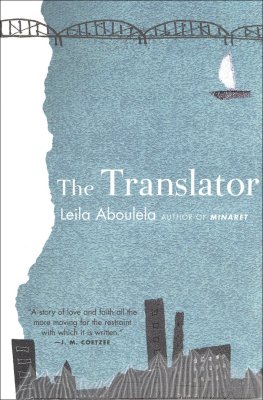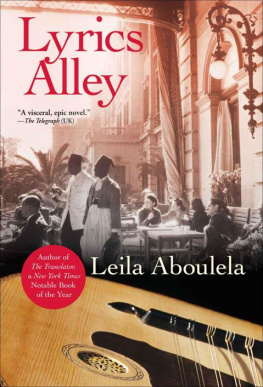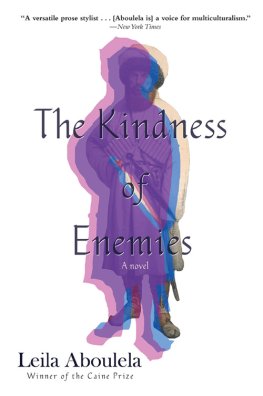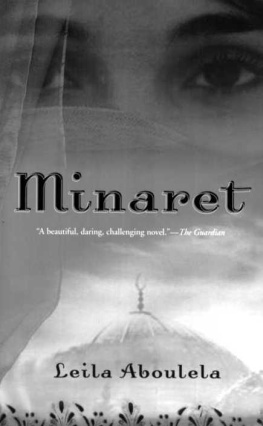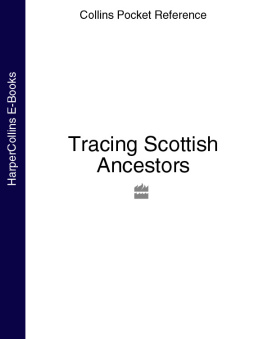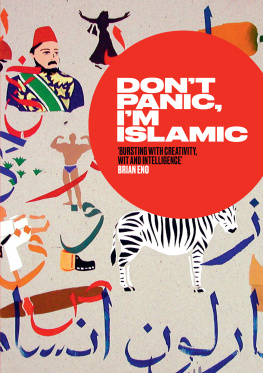Leila Aboulela
The Translator
But I say what comes to me
From my inner thoughts
Denying my eyes.
Abu Nuwas (757814)
She dreamt that it rained and she could not go out to meet him as planned. She could not walk through the hostile water, risk blurring the ink on the pages he had asked her to translate. And the anxiety that she was keeping him waiting pervaded the dream, gave it an urgency that was astringent to grief. She was afraid of rain, afraid of the fog and the snow which came to this country, afraid of the wind even. At such times she would stay indoors and wait, watching from her window people doing what she couldnt do: children walking to school through the swirling leaves, the elderly smashing ice on the pavement with their walking sticks. They were superhuman, giants who would not let the elements stand in their way. Last year when the city had been dark with fog, she hid indoors for four days, eating her way through the last packet of pasta in the cupboard, drinking tea without milk. On the fifth day when the fog lifted she went out famished, rummaging the shops for food, dizzy with the effort.
But Sammars dream was wrong. It wasnt raining when she woke that morning, a grey October sky, Scottish grey with mist from the North Sea. And she did go out to meet Rae Isles as planned, clutching her blue folder with the translation of Al-Nidaas manifesto.
The door to the Winter Gardens (an extended greenhouse in Duthie Park) was covered with signs. Sorry, no prams or pushchairs allowed, sorry, no dogs allowed, opening hours 9.30 till dusk. In this country everything was labelled, everything had a name. She had got used to the explicitness, all the signs and polite rules. It was 9.30 now and when they went inside there was only a gardener pushing a wheel-barrow along the wet cracked slabs that separated the plants. Tropical plants cramped in the damp warmth and orange fish in running water. Whistling birds flying indoors, the grey sky irrelevant above the glass ceiling.
Benches. White curved metal, each and every one bore a placard, In Loving Memory of this person or that. As if people must die so that others can sit in the Winter Gardens. People must die Her invisible mark shifted, breathed its existence. It was hidden from Rae, like her hair and the skin on her arms, it could only be imagined. Four years ago this mark had crystallised. Grief had formed, taken shape, a diamond shape, its four angles stapled on to her forehead, each shoulder, the top of her stomach. She knew it was translucent, she knew that it held a mercurial liquid which flowed up and down slowly when she moved. The diamond shape of grief made sense to her: her forehead that was where it hurt when she cried, that space behind her eyes; her shoulders because they curled to carry her heart. And the angle at the top of her stomach that was where the pain was.
So that she was somewhat prepared, now that the liquid in the diamond moved carefully like oil and was not surprised when Rae asked her about Tarig. My aunts son, she replied, but it was not until I was seven that I met him. I was born here as you know and my parents and I did not go back home until I was seven.
They were sitting on a bench in a room full of cacti. The cacti were like rows of aliens in shades of green, of different heights, standing still, listening. They were surrounded by sand for the room was meant to give the impression of a desert. The light was different too, airier, more yellow.
Not until I was seven. These were her words, the word until as if she still could not reconcile herself to those first seven years of life without him. In better times she used to reinvent the beginnings of her life. Make believe that she was born at home in Sudan, Africas largest land, in the Sisters Maternity Hospital, delivered by a nun dressed in white. She liked to imagine that Tarig was waiting for her outside the delivery room, holding his mothers hand, impatient for her, a little fidgety. Perhaps she would have been given a different name had she been born in Khartoum, a more common one. A name suggested by her aunt, for she was a woman who had an opinion on all things. Sammar was the only Sammar at school and at college. When people talked about her they never needed to use her last name. Do you pronounce it like the season, summer? Rae asked the first time she had met him. Yes, but it does not have the same meaning. And because he wanted to know more she said, It means conversations with friends, late at night. Its what the desert nomads liked to do, talk leisurely by the light of the moon, when it was no longer so hot and the days work was over.
Rae knew the Sahara, knew that most Arabic names had familiar meanings. He was a Middle-East historian and a lecturer in Third World Politics. He had recently written a book called The Illusion of an Islamic Threat. When he appeared on TV or was quoted in a newspaper he was referred to as an Islamic expert, a label he disliked because, he told Sammar, there could be no such monolith. Sammar was the translator in Raes department. She worked on several projects at the same time, historical texts, newspaper articles in Arab newspapers, and now a political manifesto Rae had given her. Al-Nidaa were an extremist group in the south of Egypt. The document was handwritten, badly photocopied and full of spelling mistakes. It was stained with tea and what she guessed to be beans mashed with oil. Last night she had stayed up late transforming the Arabic rhetoric into English, imagining she could smell beans cooked in the way she had known long ago, with cumin and olive oil, all the time trying not to think too much about the meeting next day, not to make a big thing out of it.
Among the cacti, Rae had queried Tariq?, stressing the q. She answered, Yes, its written with a qaf but we pronounce the qaf as a g back home. He nodded, he knew the letters of the Arabic alphabet, he had lived in her part of the world. Rae looked like he could easily pass for a Turk or a Persian. He was dark enough. He had told her once that in Morocco he could walk as if disguised, none suspected he was Scottish as long as he did not speak and let his pronunciation give him away. Here with others, he looked to her to be out of place, not only because of his looks but his manners. The same manners which made her able to talk to him, made the world vivid for the first time in years. The last time she had met him she had gone home ill: eyelids heavy as coins, hammers beating her head, the smallest ray of light agony to her eyes. When she stumbled into unconsciousness and woke up feeling radiant, light, she thought she must have had something like an epileptic fit.
Tarigs mother, my aunt, is called Mahasen, she went on, wondering which part of the narrative to soften, to omit. How much of the truth could he take, without a look of surprise crossing his eyes? She had never said anything that surprised him before. And she wanted it always to be like that. In this country, when she spoke to people, they seemed wary, on their guard as if any minute she would say something out of place, embarrassing. He was not like that. He seemed to understand, not in a modern, deliberately non-judgemental way but as if he was about to say, This has happened to me too.
When she boiled chicken, froth rose to the surface of the water and she removed it with a spoon. It was granulated dirt the colour of peanuts, scum from the chicken that was better not eaten. Inside Sammar there was froth like that, froth that could rise if she started to speak. Then he would see it and maybe go away, when what she wanted was for him to remove it so that she could be clear. It would be easy for him to make her clear, she thought, as easy as untying a ribbon.

